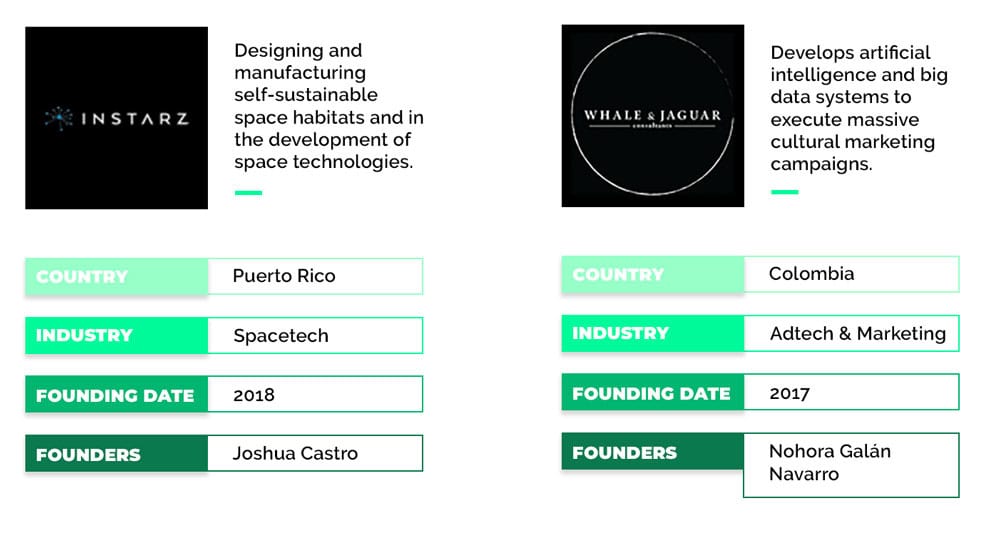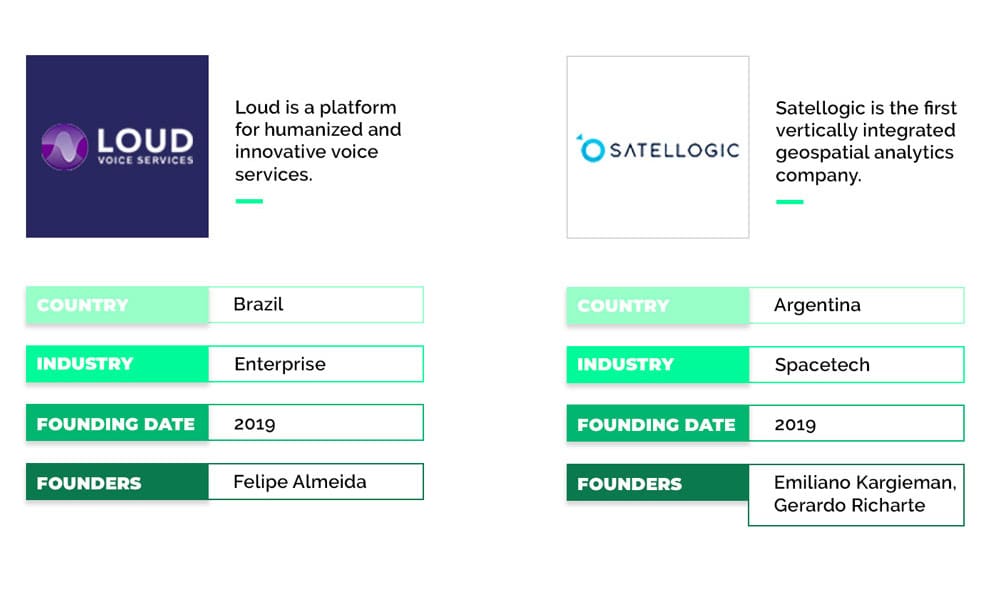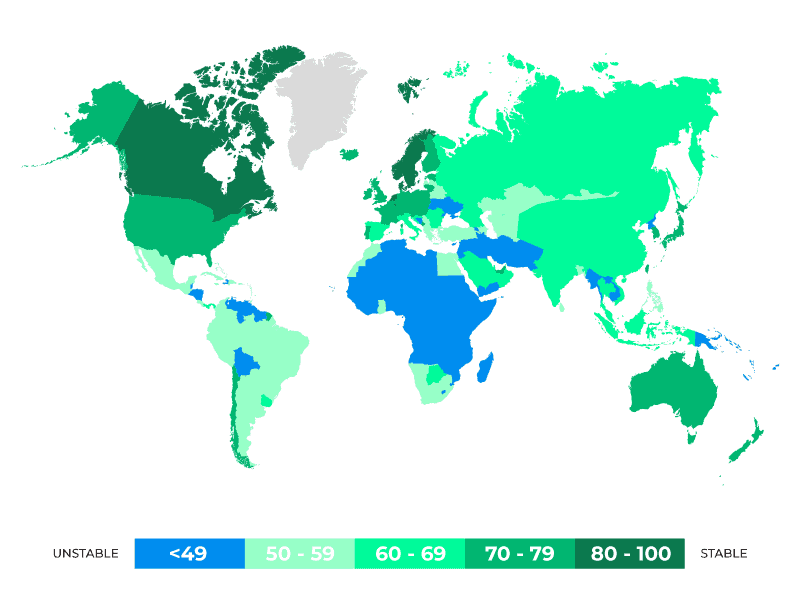
Por Alejandro González Ormerod
December 29, 2019
Contxto – It’s that time of the year when everyone gathers around and waits expectantly for old man Contxto to come down the internet shoot and dish out this year’s…
So, come with us on a trip down memory lane. Remember the year of 2019 in Latin America in all of its glory. A market that saw investment in tech double. A region that proved to be the fastest-growing on a global scale for the second year running. And a place that is so very dear to our hearts here at Contxto.
Join us in remembering its ups, its downs, its stumbles, its rebounds. Or perhaps, to put it more simply: the good, the bad, and the ugly. Here we go!

Here’s a new year’s resolution for you, tech-heads: let’s stop saying unicorn.
Aren’t you sick of hearing that word over and over again? I mean, this is probably one of the best problems the Latin American ecosystem could have right now, but at this point, I think I’ve said/heard/written the word so much that it’s starting to sound weird to me.
Indeed, this year we saw a grand total of 11 regional startups enter that exclusive and elusive Billion Plus Club—The Big B—The Bragger’s Billion—The Ten Figure Fraternity.
No matter what you call this select group, the year certainly started off on a roll:
You, dear readers, were particularly on the ball after we reported on the whispers about an investment announcement into Gympass. You went on to make this article February’s most read on Contxto. And indeed, as a matter of fact, a couple of weeks later the Brazilian fitness company would come out and declare that it had received an investment worth US$150 million.
Gympass is now comfortably in the billion-plus club, but you were way ahead of the curve on that one.
Truly, your clicks were representative of the broader market’s interest. Where your eyes went, the money followed. As folks with their finger on this ecosystem’s pulse, you set a marker that many investors should and do pay heed to.
This was true even beyond the biggest fish in the Latin American pond. Unphased by the bight lights of the billionaires, you kept everyone’s focus on those promising startups right on the cusp of glory. Of course, we’re not surprised; we’ve always known you to be trendsetters.
You proved your foresight first after the fusion of Grin and Yellow—micro-mobility companies—into Grow Mobility. Then there was the US$100 million investment into Mexico’s Clip. You made both of these our most-read stories in January and May respectively.
But, wait… There was one new billionaire startup that did catch many somewhat off balance. It seems it was because not all that many people were expecting Wildlife Studios —a Brazilian video game company—to reach the Big B. But, that’s what happens when you work hard, innovate, and keep quiet until you’re too big to ignore.
Our corrective Market Map of the Brazilian video game industry got everyone up to speed and became one of our most-read posts of the year. Obrigado!
We’ll also be keeping an eye on proptech, Loft an aspiring unicorn from Brazil.
Now, speaking of investors. A list of all the good that came to the region cannot be complete without a special mention of Latin America’s Japanese fairy godmother—Softbank.
Contxto and this investment bank are birds of a feather. We believe in much the same ethos: we share a passionate love for this region.
This is why, as of March 2019, Softbank’s Innovation Fund (SIF) has created—in its own words—“the largest-ever technology fund focused exclusively on the fast-growing Latin American market.”
The bank bets hard on Latin America and doubles down when it sees potential. It has poured its US$5 billion regional funding into the leanest and meanest operations, from household names like Colombia’s Rappi, to medium-term investments like contender neobank, Ualá, from Argentina.
What do most of these investments have in common? They flow to what retrospectively seems like sure-bets. Indeed, with the amount of money that this Japanese bank is playing with, an investment by Softbank often becomes a self-fulfilling prophecy of success (does it?).
This has made it Latin America’s premier unicorn breeder. And, with 2019 seeing the number of unicorns multiply with each passing month, we can only thank Softbank for making Latin America increasingly horny.
Oh wait, sorry. I’d forgotten that we were not saying that word anymore. Perhaps, if only for the sake of puns and metaphors, we should keep “unicorn” around for at least one more year.
And now, a special shout out to all those startups that went above and beyond in the sophistication of their wares.
Being a startup in Latin America is not easy. However, to take the market by the horns and truly innovate in an industry full of copycats, well, that really does require a good pair of… binoculars.
What? You know, to have been able to see those market opportunities so far in the distance. What did you think I was going to say?
So hats off to you:


Something we at Contxto pride ourselves in is our focus on the underrepresented. It comes naturally when our job is to show off a historically neglected region. However, our hearts really shine when we get to witness the rise of those who are all too often completely ignored.
When it came to demographic or geographic inclusion, 2019 did not disappoint.
For instance, the memo seems to have finally gotten through that ignoring one half of a market makes poor business (not to mention ethical) sense. Therefore, the growing representation of women in tech and VC (venture capital) seems like this year’s long-time-coming no-brainer.
Indeed, the change, only compared to the past two years, is startling. All the way back in the dark ages of 2018, there were only 15 women founders of the world’s billion-dollar startups. By 2019, there were 21 women at their helm.
Latin America is on its way to pulling its weight on this front. Specifically, Brazil’s Nubank, the only unicorn out of the regions’ 11 billionaire companies to have female representation among its top ranks. Hence, a special hats-off to Nubank and its co-founder Cristina Junqueira.
Yet, we hopefully won’t have to wait too long to see more women charging the ecosystem on their very own unicorns.
Keep your eye out for cunning female-led startups like Argentine soccer-scouting app, Gloria, or Colombian proptech, Habi, or the city of Lima’s plethora of female-founded startups. We even made a market map for that last one. Check it out.
In a similar vein, underrepresented countries in Latin America also good a boost this year. Often overlooked smaller markets got more funding than ever before. The likes of Soujourn from Puerto Rico, Huli, and Sports Sonar from Costa Rica, Meitre from Uruguay, Coco and EnjoyHQ from Venezuela, Mipos.dev and Parallevar from Ecuador, and El Salvador’s HugoApp, all got the 2019 bump.
There is still a long way to go in terms of inclusivity, democratization, and representation in this part of the world. But, we are happy to say that our niche ecosystem is not only leading in terms of innovation, it is also often at the vanguard of a broader social movement.
2019 was the year in which Latin American startups took the spotlight within the international tech community. Specifically during Y Combinator’s Demo Days. The event saw more than 16 startups from the region participate during this year’s winter batch.
As mentioned above, not only did the big blokes like Mexico, Brazil, Argentina, and Colombia join the game, but smaller players did too. For the first time in YC’s history companies from Venezuela, Ecuador, and Uruguay joined fray at the renowned Silicon Valley accelerator
Check out the full map Latam’s most relevant in foreign accelerators (YC 2019) of the year here:


Diversity is this region’s hallmark. It’s what makes our cultures interesting, fun, and enriching. However, if diversity is the word, then with all the above-mentioned goodness, there must also be a healthy dose of bad news.
Take saturation, which is starting to take its toll in markets that didn’t even exist a few years ago. Over the course of 2019, we were able to see the shift in strategies in adaptation to this change.
Take all the mergers and acquisitions that have littered the ecosystem these past few months. Think Grow Mobility or Uber buying a majority share in Cornershop.
But sometimes, even the giants tumble. This is what we saw in April when Brazil’s Glovo ignominiously pulled out of Chile, only to go on to declare it was hemorrhaging money.
It was a tragic setback. Glovo’s turnover had been a good looking US$84 million per annum, but that figure was made to look pretty silly next to the US$101 million it had lost over the same period.
There were also times in which we thought that the newfound love for tech and startups that Latin American governments preached was all lies.
Nowhere was this better exemplified than with the Mexican government’s refusal to allow Cornershop to merge with Walmart. The whole operation was indeed tricky business since the State-sanctioned veto did in fact block a form of vertical integration that carried some elements of monopolistic market control.
Nevertheless, the experience and the way it was done put a shock through the regional ecosystem’s system. Our CEO, Víctor Cortés, was rather shaken by the event as he tried to make sense of the whole ordeal, concluding:
“My final point is this: yes, let’s ponder, reflect and adapt our business plans to plausible similar future outcomes. All the while, let’s look at the bright side of this event—more features, more ideas, and more market options. Perhaps, it might be time to reconsider our exit alternatives, stake out our regional public market structure, and aim for stock charts instead of M&As.”
Víctor Cortés, “Is Walmart’s rejection over acquiring Cornershop that bad after all?”
Learning experiences, true. But, man, what a bummer some of them have been.

Remember how I was going on about how inclusive the regional ecosystem had become a few paragraphs back? Well, I mean, I wasn’t lying, but we do have to talk about how much ground we need to cover before we really start patting ourselves on the back.
Take that figure of 21 women-led unicorns worldwide in 2019 versus 2018’s 15. What I failed to mention was that the growth rate of billionaire companies was actually larger, so the share of women founders in the exclusive billion-dollar club actually went down.
The trend was the same in Latin America, but with an extra rub. Although the region has a higher rate of startup creation by women than other places around the globe—there are 17 women for every 20 male entrepreneurs—, the catch is that the funding for these companies is not even close to as equal.
All-male-led startups gobbled up around 80 percent of all VC funding this year. That is pretty pathetic, especially considering that Latin American women receive only 0.4 of the world’s investment money.
So, who could possibly save these women? Well, it seems that they have taken the task onto themselves. What has become clear that women invest in women.
Therefore, the key is more women on investment boards and atop startups as founders. The region seems to be on the right path, but, (wo)man, it seems like we’ll take a while to get there.
It is perhaps natural for a place like Contxto to be on the more open end of the political spectrum. We love investment flooding in from abroad toward our thirsty young startups. We love it when our wares and brands sally forth into lands beyond our native shores.
Others, however, do not share our same passions. This was made rather clear to us over the course of 2019.
Over the past year, a stark division has heightened across the globe. It has been one dividing internationalists and localists. This schism can be seen across Latin America as well. But, it is here, particularly where localism threatens to cause a special kind of damage.
The rise of isolationism is problematic for any region. Yet, unlike China, the US, or Europe, Latin America does not have a preexisting unified market. In this part of the world, a company’s regional expansion is often contingent on political will—take the Pacific Alliance versus Mercosur for instance.
Growing startups often depend on the regional ecosystem to test out growth strategies on friendlier neighboring turfs. This strategy is rather more palatable to many compared to setting off into the more aggressive and saturated American or European markets.
That’s the issue with closing down borders in the region. Apart from the two regional giants, Latin America’s individual countries constitute relatively small markets.
Indeed, the boom times for the likes of Rappi came not from obsessing over the Colombian market, but rather through its continental growth. Unicorns become scarce without trans-regional expansion.
With the rise of isolationism, nationalism, and parochialism, a startup slowdown becomes all the more likely. Unfortunately, and irrespective of political affiliation, we have seen these traits rise in countries with left-leaning governments like Mexico and Argentina, as well as right-wing regimes like Brasil’s.
Couple this with the slowing of the global economy and increased world-wide socio-political instability, and the clouds ahead look bearish indeed. So beware, dear founders: although this year has seen a bonanza for the local tech and startup ecosystem, I hope you have your contingency plans ready for 2020’s darker days.


There has definitely been some gathering of steam in this ecosystem over the past year. Some startups have flourished, others have overheated, crashed, and burned. But even these last unfortunate souls have the honor of having fought the good fight.
And then there’s what has been going on with startups like Picap and Weeshing.
On one hand, we had a poorly run music concert platform which ended up looking more like a pyramid scheme. The Weeshing fiasco saw fans giving money to intermediary organizers who often ran off with the money, leaving the musicians and the investors high and dry.
The startup’s reaction was simply to name and shame the villainous middlemen with little more than the suggestion that the investors should form a litigious lynch mob.
Then there was the Picap debacle. A master class in how not to handle a public affairs scandal.
Investigative journalism into the WhatsApp conversations of Picap’s drivers revealed some disturbing things. Motorcyclists for the ride-hailing startup had engaged in drugs, alcohol, and other illicit content while on the job. After this, a massive blame game between the company and the drivers took off. Fingers we pointed and no one took responsibility. In the end, Picap’s application was blocked in Peru.
There has been an underlying theme to all this ugliness: lagging or inadequate governmental regulation.
It is undeniable that governments exist to safeguard societies from their worst impulses. That is the purpose of regulation. Furthermore, it is also difficult to argue with the fact that the tech and startup ecosystems are particularly tough to regulate for. They are, after all, disruptive and new by nature.
However, in Latin America—oft the land of conflicting interests—many government rules tend to benefit certain groups or individuals. This results in the problems and faults we’ve seen all year long with regulation surrounding last-mile delivery, last-mile mobility, and fintech—that is; when those regulations even exist!
It’s not that governments are bad and startups are good, necessarily.
Regulations are, to put it bluntly, fundamental. Some might not like the new rules. Some might think they go too far, some that they don’t go far enough, others that they are just right. That’s not only natural; it is beside the point. For an investment, startup, and tech ecosystem to work well anywhere, the rules of the game must be clearly laid out for all to see.
So, the sooner this region gets its act together and sorts out these rules, the sooner everyone else can get to innovating and creating value for everyone—governments, citizens, consumers, and the companies themselves.


We had to do it; the 2020 eyesight puns are too juicy not to be made. And anyway, although we are in the fact-reporting business rather than the fortunetelling one, we are pretty confident that these following predictions will come true in this year to come.
We foresee that:

That’s it form us from the year 2019! But, BTW—before this wraps-up—we’d like to wish you an even more prosperous new year than the last. We are certainly coming in hot into the twenties, because, you see, Contxto is has a special announcement:
We are launching our database in 2020! (We didn’t one have back when we wrote last year’s edition). Sign up to keep up to date with the best and most comprehensive list of startups, investors, and data on offer anywhere in the ecosystem.
So from your friends over at Contxto: thank you for sticking with us for over a year of tech, startups, and funding, and thank you for sticking with us for this coming year of 2020.
Related article: 11 Mexican startups to watch in 2020!
-AG, VC

Por Stiven Cartagena
January 12, 2026